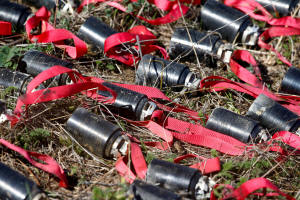Humanitarian crisis feared as Nagorno-Karabakh ceasefire buckles
 Send a link to a friend
Send a link to a friend
 [October 13, 2020]
By Nvard Hovhannisyan and Nailia Bagirova [October 13, 2020]
By Nvard Hovhannisyan and Nailia Bagirova
YEREVAN/BAKU (Reuters) - Armenia and
Azerbaijan accused each other on Tuesday of violating a humanitarian
ceasefire agreed three days ago to quell fighting over Nagorno-Karabakh,
drawing warnings from international groups of a humanitarian crisis in
the region.
A Reuters cameraman witnessed shelling in the town of Martuni in
Nagorno-Karabakh, a mountain enclave which is internationally recognised
as part of Azerbaijan but governed and populated by ethnic Armenians.
A Reuters television crew in Terter in Azerbaijan also said the city
centre was being shelled earlier on Tuesday.
The Russian-brokered ceasefire, aimed at allowing the sides to swap
prisoners and bodies of those killed, is buckling, dimming peace
prospects after deadly clashes broke out on Sept. 27..
Azerbaijan's defence ministry said Armenian forces were shelling the
Azeri territories of Goranboy and Aghdam, as well as Terter, and
"grossly violating the humanitarian truce".

"Azeri armed forces are not violating the humanitarian ceasefire,"
defence ministry spokesman Vagif Dargiahly said.
Armenian defence ministry spokeswoman Shushan Stepanyan denied the
accusation. She said Azeri forces had resumed military operations after
an overnight lull, "supported by active artillery fire in the southern,
northern, northeastern and eastern directions".
The flare-up of fighting is the worst since a 1991-94 war over
Nagorno-Karabakh that killed about 30,000.
It is being closely watched abroad partly because it is close to Azeri
gas and oil pipelines to Europe, and Turkey and Russia risk being
dragged in. Russia has a defence pact with Armenia, while Turkey is
allied with Azerbaijan.
Turkey is not involved in the mediation, which has been led by France,
Russia and the United States. Ankara says it backs Azerbaijan's
offensive to "retake its occupied lands.
Nationalist Turkish politician Devlet Bahceli, whose party supports
President Erdogan's AKP in parliament, accused the West and Russia of
blocking Turkey from the talks and described the moves proposed so far,
including the ceasefire, as "traps".
Azerbaijan must secure Nagorno-Karabakh by "hitting Armenia over the
head over and over again", Bahceli said.
Armenian President Armen Sarkissian told Bild newspaper he was concerned
about Turkey's behaviour during the crisis and urged the international
community to do more to condemn Ankara - which has denied military
involvement in Nagorno-Karabakh.
[to top of second column]
|

Unexploded cluster bomblets collected after recent shelling during
the military conflict over the breakaway region of Nagorno-Karabakh
are seen on the outskirts of Stepanakert October 12, 2020.
REUTERS/Stringer

"I worry because, firstly, there is a third party involved. If it
were only about Nagorno-Karabakh and Azerbaijan, I would be much
more hopeful that the conflict can be contained," he said.
DEAD AND WOUNDED
The death toll has continued to rise, meanwhile. Ethnic Armenian
officials in Nagorno-Karabakh said their military death toll was
542, up 17 from Monday.
Azerbaijan has reported 42 Azeri civilian deaths and 206 wounded
since Sept. 27. It has not disclosed military casualties.
Martin Schuepp, Eurasia regional director for the International
Committee of the Red Cross (ICRC), said his organisation was in
"continuous discussions" to facilitate the handover of detainees or
bodies of those killed but no meaningful agreement had been reached.
"The security situation has also been such for us and our teams that
it has not been possible for us to access all locations that might
have been affected," Schuepp said.
The conflict is also worsening the spread of COVID-19 across both
countries, Tarik Jasarevic told a United Nations briefing in Geneva.
Armenia's new cases had doubled over the past 14 days as of Monday,
while new infections were up approximately 80% over the past week in
Azerbaijan, Jasarevic said, warning of "direct disruption to health
care and a further burden on health systems that are already
stretched during the COVID pandemic."
With tens of thousands of people potentially needing assistance over
the next three months, the ICRC has issued an appeal for another 9.2
million Swiss francs ($10.10 million) to fund its humanitarian
efforts in the region, Schuepp added.

(Additional reporting by Margarita Antidze in Tbilisi, Riham
Alkousaa in Berlin and Stephanie Ulmer-Nebehay in Geneva; Writing by
Sujata Rao; Editing by Giles Elgood and Timothy Heritage)
[© 2020 Thomson Reuters. All rights
reserved.] Copyright 2020 Reuters. All rights reserved. This material may not be published,
broadcast, rewritten or redistributed.
Thompson Reuters is solely responsible for this content. |